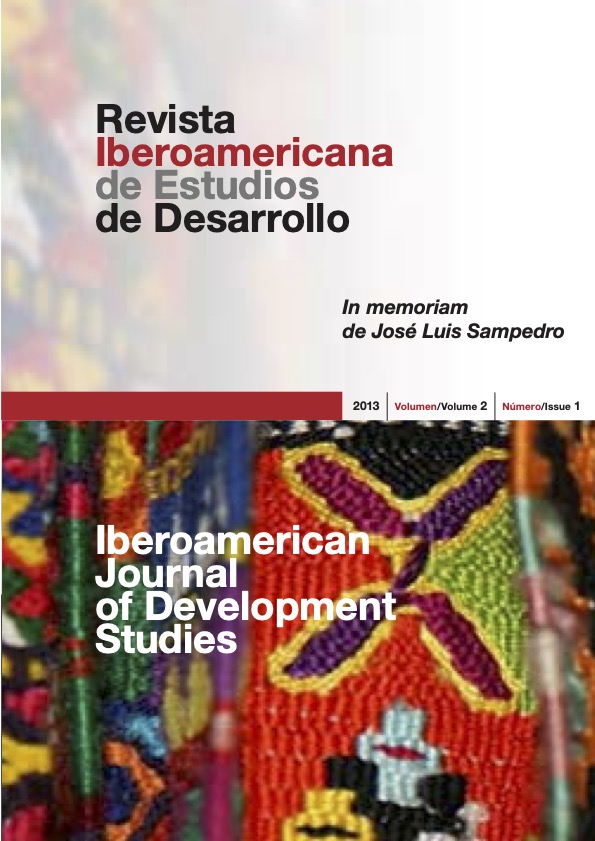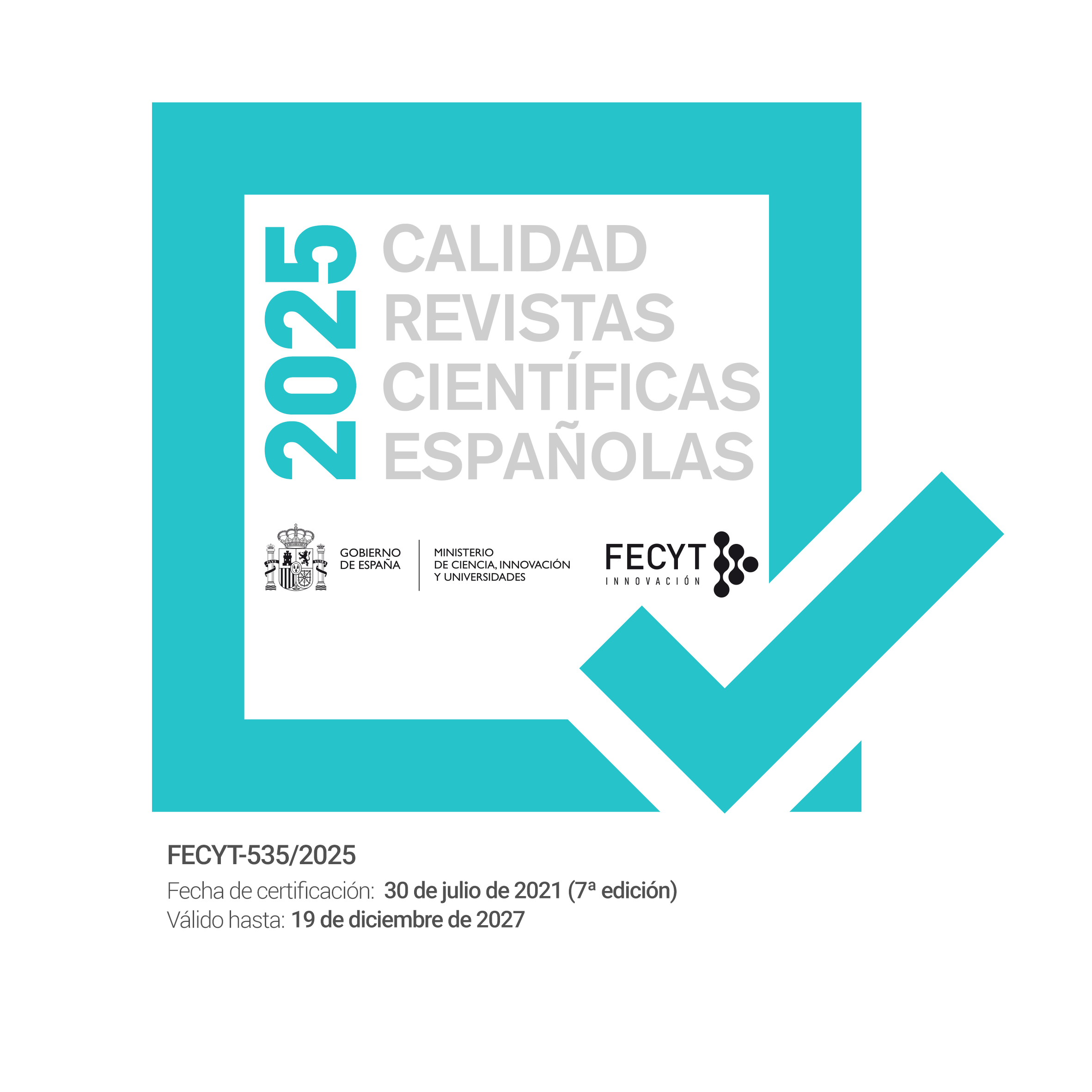Theories of International Relations and the Explanation of Foreign Aid
DOI:
https://doi.org/10.26754/ojs_ried/ijds.65Keywords:
Theories of international relations, Foreign aid, Aid allocationAbstract
50 years after the publication of the first and influential article in international relations (IR) analyzing foreign aid motivations, A theory of foreign aid, by Hans Morgenthau, IR scholarship has not yet accomplished a consistent theoretical body explaining international development cooperation. Most of the empirical studies on foreign aid have been contributions from other disciplines, especially economics. Research from the field of international relations has been mostly descriptive or poorly connected with IR paradigms.
This article proposes to analyze motivations of foreign aid allocations decisions of donors. These motivations will be examined from the theoretical perspective of the international relations scholarship. In this way, it is sought to contribute, from the discipline of IR, to the explanation of the process in which developed countries make transfers of resources to developing countries.
CITE AS:
Pauselli, G. (2013). Teorías de relaciones internacionales y la explicación de la ayuda externa. Iberoamerican Journal of Development Studies, 2 (1): 72-92
Downloads
References
ALESINA A, DOLLAR D (2000). Who gives foreign aid to whom and why. Journal of Economic Growth 5(1):33-63
ALESINA A, WEDER B (2002). Do Corrupt Governments Receive Less Foreign Aid? The American Economic Review 92(4):1126-1137
ALONSO JA, GARCIMARTÍN C, MARTÍN V (2010). Ayuda, calidad institucional e imposición: Algunos desafíos para el sistema de cooperación internacional. Conference on Development Cooperation in Times of Crisis and on Achieving the MDGs. Madrid, 9 y 10 de junio
AUBUT J (2004). The good governance agenda: Who wins and who loses. Working Paper No. 04-48. Development Studies Institute, London School of Economics and Political Science AYLLÓN B (2007). La Cooperación Internacional para el Desarrollo: fundamentos y justificaciones en la perspectiva de la Teoría de las RRII. Carta Internacional 2(2):32-47
BERTHÉLEMY JC (2006). Bilateral donors’ interest vs. Recipients’ development motives in aid allocation: Do all donors behave the same? Review of Development Economics 10(2):179-194
BERTHÉLEMY JC, TICHIT A (2002). Bilateral Donors’ Aid Allocation Decisions. A three-dimensional panel analysis. Discussion Paper No. 2002/123. World Institute for Development Economics Research
BURNSIDE C, DOLLAR D (2004). Aid, Policies, and Growth: Revisiting the Evidence. World Bank Policy Research Paper No. O-2834
CANAVIRE G, NUNNENKAMP P, THIELE R, TRIVEÑO L (2005). Assessing the Allocation of Aid: Developmental Concerns and the Self-Interest of Donors. Kiel Working Paper No. 1253. Kiel Institute for World Economics
CARDOSO FH, FALETTO E (1969). Dependencia y desarrollo en América Latina. Siglo XXI Editores, México
CARDOSO FH, FALETTO E (1977). Post scriptum a ‘Dependencia y Desarrollo en América Latina’. Desarrollo Económico 17(66):273-299
COX RW (1983) Gramsci, Hegemony and International Relations: An Essay in Method. Millennium: Journal of International Studies 12(2):162-175
DEUTSCH KW (1953). Nationalism and Social Communication: An Inquiry into the Foundations of Nationality. Massachusetts Institute of Technology Press, Cambridge
DOLLAR D, LEVIN V (2006). The increasing selectivity of foreign aid, 1984-2003. World Development 34(12):2034-2046
DOYLE MW (1983). Kant, Liberal Legacies, and Foreign Affairs. Philosophy and Public Affairs 12(3):205-235
DOYLE MW (1986). Liberalism and World Politics. The American Political Science Review 80(4):1151-1169
DREHER A, NUNNENKAMP P, THIELE R (2006). Does US Aid buy UN General Assembly Votes? A Diaggregated Analysis. Kiel Working Paper Paper No. 1275
FINNEMORE M (1996). National Interests and International Society. Cornell University Press, Ithaca
FINNEMORE M, SIKKINK K (2001). Taking Stock: The Constructivist Research Program in International Relations and Comparative Politics en Annual Review of Political Science 4:391-416
FUKUYAMA F (1989). The End of History? The National Interest. Summer 1989
GADDIS JL (1991). Toward the Post-Cold War World. Foreign Affairs 70(2):102-122
GOLDSTEIN J, KEOHANE RO (1993). Ideas and Foreign Policy: Beliefs, Institutions, and Political Change. Cornell University Press, Ithaca
HAAS EB (1980). Why Collaborate? Issue-Linkage and International Regimes. World Politics 32(3):357-389
HATTORI T (2003). The Moral Politics of Foreign Aid. Review of International Studies 29(2):229-247
HAYTER T (1971). Aid as Imperialism. London, Penguin Books
HOPF T (1998). The Promise of Constructivism in International Relations. International Security 23(1):171-200
ISOPI A, MAVROTAS G (2006). Aid allocation and aid effectiveness. An empirical analysis. Research Paper No. 2006/07, Economics Research, World Institute for Development, United Nations University
IWANAMI Y (2010). Delegating Power to Govern Security Affairs: The Composition of the UN Security Council. APSA 2010 Annual Meeting Paper
JERVIS R (1999). Realism, Neoliberalism and Cooperation: Understanding the Debate. International Security 24(1):42-63
JERVIS R (2001). The Meaning of Nuclear Revolution: Statecraft and the Prospect of Armageddon. Cornell University Press, Ithaca
JORDAN R, MALINIAK D, OAKES A, PETERSON S, TIERNEY MJ (2009). One discipline or many? TRIP Survey of International Relations Faculty in Ten Countries. Teaching, Research, and International Policy (TRIP) Project. The Institute for the Theory and Practice of International Relations KEOHANE RO (1984). After Hegemony. Cooperation and Discord in the World Political Economy. Princeton University Press, Princeton
KEOHANE RO (1989). International Institutions and State Power. Essays in International Relations Theory. Westview Press, Boulder
KEOHANE RO, NYE J (1987). Power and Interdependence Revisited. International Organization 41(4):725-753
KERN A, LÓPEZ CANELLAS F (2010). Aspectos simbólicos y relaciones de poder en el análisis de la cooperación al desarrollo. Jornadas de RRII Poderes emergentes: ¿Hacia nuevas formas de concertación internacional? Área de RRII, Facultad Latinoamericana de Ciencias Sociales, sede Buenos Aires
KRASNER S (2001). Soberanía: hipocresía organizada. Paidós, Barcelona
KRAUTHAMMER, C (1990). The Unipolar Moment. Foreign Affairs 70(1):23-33
KUBÁLKOVÁ V, CRUICKSHANK AA (1989). Marxism and International Relations. Oxford University Press, New York
KUZIEMKO I, WERKER E (2006). How Much is a Seat on the Security Council Worth? Foreign Aid and Bribery at the United Nations. Journal of Political Economy 114(5):905-930
LANCASTER C (2007). Foreign Aid. Diplomacy, development and domestic politics. University of Chicago Press, Chicago
LUMSDAINE DH (1993). Moral Vision in International Politics. The Foreign Aid Regime 1949-1989. Princeton University Press, Princeton
MACMILLAN J (2004). Liberalism and the Democratic Peace. Review of International Studies 30(2):179-200
MALINIAK D, PETERSON S, TIERNEY MJ (2012). TRIP Around the World: Teaching, Research, and Policy Views of International Relations Faculty in 20 Countries. Teaching, Research, and International Policy (TRIP) Project. The Institute for the Theory and Practice of International Relations, College of William and Mary
MCDONALD PJ (2004). Peace through Trade of Free Trade? The Journal of Conflict Resolution 48(4):547-572
MCKINLAY RD, LITTLE R (1977). A Foreign Policy Model of U.S. Bilateral Aid Allocation. World Politics 30(1):58-86
MEARSHEIMER J, WALT S (2012). Leaving Theory Behind: Why Hypothesis Testing Has Become Bad for IR. Faculty Research Working Paper Series 13-001, John F. Kennedy School of Government, Harvard University
MEERNIK J, KRUEGER EL, POE SC (1998). Testing Models of U.S. Foreign Policy: Foreign Aid during and after the Cold War. The Journal of Politics 60(1):63-85
MONTÚFAR C (2004) Hacia un nuevo marco interpretativo de la asistencia internacional para el desarrollo. En: Gómez J. M. América Latina y el (des)orden global neoliberal. Hegemonía, contrahegemonía, perspectivas. Consejo Latinoamericano de Ciencias Sociales, Buenos Aires, 245-258
MORAVCSIK A (2010). ‘Wahn, Wahn, Überal Wahn’: A reply to Jahn’s critique of liberal internationalism. International Theory 2(1):113-139
MORGENTHAU H (1962) A political theory of foreign aid. American Political Science Review 56(2):301-309
MORGENTHAU H (1969). A New Foreign Policy for the United States. Pall Mall Press, London
MORGENTHAU H (1986). Política entre las naciones: la lucha por el poder y la paz. Grupo Editor Latinoamericano, Buenos Aires
MORGENTHAU H (1990). Escritos sobre política internacional. Tecnos, Madrid
NEUMAYER E (2003). Do human rights matter in bilateral aid allocation? A quantitative analysis of 21 donor countries. Social Science Quarterly 84(3):650-666
NOËL A, THÉRIEN JP (1995). From Domestic to International Justice: The Welfare State and Foreign Aid. International Organization 49(3):523-553
RATHBUN B (2010). Is Anybody Not an (International Relations) Liberal? Security Studies 19(2):2-25
ROGERS P (2000). Losing Control. Global Security in the Twenty-first Century. Pluto Press, London
RUTTAN VW (1987). Why Foreign Economic Assistance? Economic Development and Cultural Change 37(2):411-424 SCHRAEDER PJ, HOOK SW, TAYLOR B (1998). Clarifying the Foreign Aid Puzzle: A comparison of American, Japanese, French, and Swedish Aid Flows. World Politics 50:294-32
SHARMAN JC, WEAVER C (2011). Between the Covers: International Relations in Books. Institute for Global and International Studies Research Seminar Series, George Washington University
SNIDAL D, WENDT A (2009). Why there is international theory now? International Theory 1(1):1-14
SOGGE D (2002). Two: Who is aiding whom? In: Sogge, D. Give and Take: What’s the Matter with Foreign Aid? Zed Books, London and New York, 24-39
STERLING-FOLKER J (2000). Competing Paradigms or Birds of a Feather? Constructivism and Neoliberal Institutionalism Compared. International Studies Quarterly 44(1):97- 119
SULLIVAN PL, TESSMAN BF, LI X (2011). US Military Aid and Recipient State Cooperation. Foreign Policy Analysis 7:275-294
TEZANOS VÁZQUEZ S (2008). Modelos teóricos y empíricos de asignación geográfica de la ayuda. Principios: estudios de economía política 10:5-39
THÉRIEN J (2002). Debating Foreign Aid: Right versus Left. Third World Quarterly 23(3):449-466
THÉRIEN J, NOËL A (2000). Political Parties and Foreign Aid. American Political Science Review 94(1):151-162
THOMPSON K (1955). Toward a Theory of International Politics. The American Political Science Review 49(3):733-746
THORBECKE E (2000). The evolution of the development doctrine and the role of foreign aid, 1950-2000. In: Tarp, F. Foreign Aid and Development. Lessons Learnt and Directions for the Future. Routledge, New York, 12-35
TINGLEY D (2010). Donors and Domestic Politics: Political Influences on Foreign Aid Effort, The Quarterly Review of Economics and Finance 50:40-49
TRUMBULL WN, WALL HJ (1994). Estimating Aid-Allocation Criteria with Panel Data. The Economic Journal 104(425):876-882
VAN DER VEER AM (2011). Ideas, Interests and Foreign Policy. Cambridge University Press, Cambridge
WALLERSTEIN I (1996). The Insterstate Structure of the Modern World System. In: Smith S, Booth K, Zalewski M (eds.). International Theory: Positivism and Beyond. Cambridge University Press, Cambridge, 85-107
WALTZ K (1959). El hombre, el estado y la guerra. Nova, Buenos Aires
WALTZ K (1988). Teoría de la política internacional. Grupo Editor Latinoamericano, Buenos Aires
WALTZ K (2000). Structural Realism after the Cold War. Internationale Security 25(1):5-41
WANG TY (1999). US Foreign Aid and UN Voting: An Analysis of Important Issues. International Studies Quarterly 43(1):199-210
WENDT A (1994). Collective Identity Formation and the International State en The American Political Science Review 88(2): 384-396
WENDT A (1999). Social Theory of International Politics. Cambridge University Press, Cambridge
WITTKOPF ER (1973). Foreign Aid and United Nations Votes: A comparative Study. The American Political Science Review 67(3):868-888
Downloads
Published
Issue
Section
License
Copyright (c) 2013 Gino Pauselli

This work is licensed under a Creative Commons Attribution-NonCommercial-NoDerivatives 4.0 International License.





